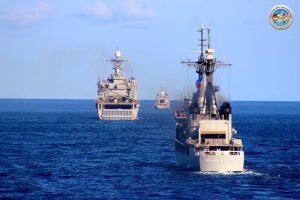France and the Philippines are set to being talks on a defense agreement that would allow troops from each country to hold exercises in the other’s territory, in the latest sign of Manila’s growing security cooperation with its partners.
In a press conference yesterday, Marie Fontanel, the French ambassador in Manila, said that officials from the two nations would meet in Paris next month for talks on a visiting forces agreement, the Associated Press reported.
“We will have an opportunity in May to maybe start officially the negotiations or, at least, discuss the modalities,” Fontanel said at a news conference with visiting French Ambassador to the Indo-Pacific Marc Abensour, according to the AP.
The agreement, which was first mooted by the French and Philippine defense chiefs in December of last year, will allow the two countries to send military forces to each other’s territory for joint exercises. At the time, French Minister for the Armed Forces Sebastien Lecornu said that the primary purpose of the agreement was “to create interoperability or a strategic closeness between both armed forces, see how both navies work together, how air forces work together.”
The proposed French-Philippine agreement will presumably bear some similarity to the Visiting Forces Agreement (VFA) that the Philippines signed in 1998 with the U.S. government, which sets the guidelines for the entry and operation of U.S. troops in the Philippines and vice-versa. The Philippines also signed a Status of Visiting Forces Agreement with Australia in 2007.
The proposed agreement is the latest sign of the maturing cooperation between the Philippines and various partners concerned by China’s increasingly belligerent actions in the South China Sea. Much of the recent Chinese attention has focused on Second Thomas Shoal, a Philippine-claimed feature in the Spratly Islands.
Over the past 18 months, the China Coast Guard and maritime militia vessels have harried and harassed Philippine vessels seeking to resupply the small contingent of marines stationed in a grounded warship at the Second Thomas Shoal. This has led to a number of dangerous incidents in which Philippine Coast Guard vessels and supply boats have been rammed or sprayed with high-pressure water cannons.
The Chinese pressure campaign has prompted the Philippines to deepen its security cooperation with other nations concerned about China’s growing maritime clout. Under President Ferdinand Marcos Jr., it has expanded U.S. military access to Philippine military facilities under the 2014 Enhanced Defense Cooperation Agreement, and held joint maritime patrols with the U.S., Japan, and Australia.
The Philippines and Japan have also held talks on a proposed Reciprocal Access Agreement (RAA), akin to the VFA with the U.S., which Philippine officials said could be signed by the end of 2024. According to the president’s office, the agreement with Japan “is expected to greatly boost maritime cooperation between the two countries as the proposed RAA will facilitate the procedures and set guidelines when Philippine forces visit Japan for training and joint exercises, and vice versa.”
France has been increasing its security engagement with the Philippines, especially under its Indo-Pacific strategy, which it promulgated in 2018 with eyes to both China’s massing economic and military power, and its own vast maritime domains in the southern part of the Pacific and Indian oceans.
In 2015, France and the Philippines established an “enhanced partnership,” stating in a joint declaration announcing it that they opposed “any acquisition or claim” that was “in violation of international law.” The following year, French vessels joined U.S. aircraft carriers in patrolling the contested waterway. France has also sent its own vessels on frequent voyages through the South China Sea.
In similar vein, French officials have condemned the recent Chinese actions in waters claimed by the Philippines, and the country’s navy is taking part for the first time in the Balikatan joint military exercise that started this week in the Philippines. The warship FS Vendemiaire joined the Philippine and U.S. navies for war games off the coast of Palawan island in the South China Sea.

































